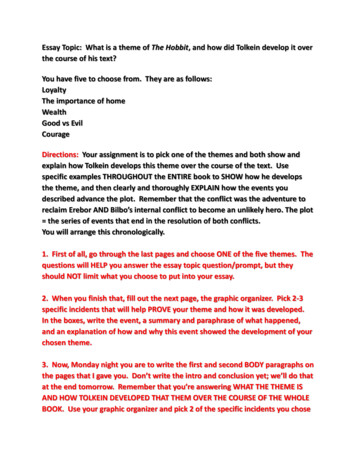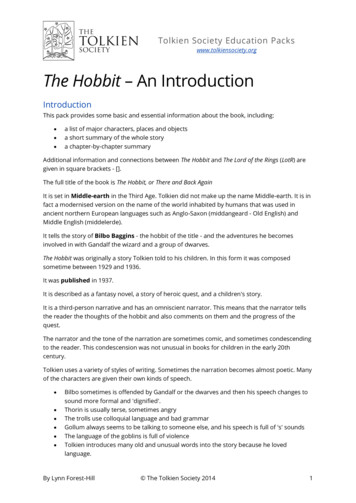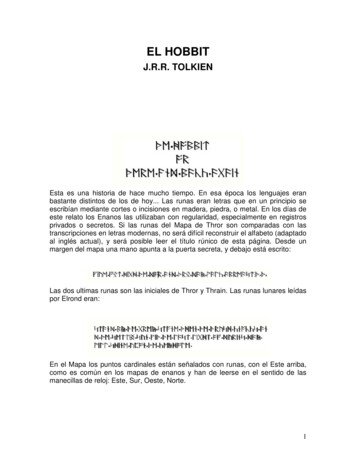
Transcription
HobbitSCM CompilerVersion 5f3Tanel TammetDepartment of Computing ScienceChalmers University of TechnologyUniversity of Go"teborgS-41296 Go"teborg Sweden
This manual is for the Hobbit compiler for SCM (version 5f3, February 2020),Copyright c 2002 Free Software FoundationPermission is granted to make and distribute verbatim copies of this manualprovided the copyright notice and this permission notice are preserved on allcopies.Permission is granted to copy and distribute modified versions of this manualunder the conditions for verbatim copying, provided that the entire resultingderived work is distributed under the terms of a permission notice identical tothis one.Permission is granted to copy and distribute translations of this manual intoanother language, under the above conditions for modified versions, except thatthis permission notice may be stated in a translation approved by the author.
iTable of Contents1Introduction . . . . . . . . . . . . . . . . . . . . . . . . . . . . . . . . . . . . . 12Compiling with Hobbit . . . . . . . . . . . . . . . . . . . . . . . . . 22.12.22.32.43The Language Compiled . . . . . . . . . . . . . . . . . . . . . . . . 83.13.23.33.43.53.64Gain in Speed . . . . . . . . . . . . . . . . . . . . . . . . . . . . . . . . . . . . . . . . . . . . . . . . . 14Benchmarks . . . . . . . . . . . . . . . . . . . . . . . . . . . . . . . . . . . . . . . . . . . . . . . . . . . 15Benchmark Sources . . . . . . . . . . . . . . . . . . . . . . . . . . . . . . . . . . . . . . . . . . . . 164.3.1 Destruct . . . . . . . . . . . . . . . . . . . . . . . . . . . . . . . . . . . . . . . . . . . . . . . . . . 164.3.2 Recfib . . . . . . . . . . . . . . . . . . . . . . . . . . . . . . . . . . . . . . . . . . . . . . . . . . . . 164.3.3 div-iter and div-rec . . . . . . . . . . . . . . . . . . . . . . . . . . . . . . . . . . . . . . . 174.3.4 Hanoi . . . . . . . . . . . . . . . . . . . . . . . . . . . . . . . . . . . . . . . . . . . . . . . . . . . . 174.3.5 Tak . . . . . . . . . . . . . . . . . . . . . . . . . . . . . . . . . . . . . . . . . . . . . . . . . . . . . . 184.3.6 Ctak . . . . . . . . . . . . . . . . . . . . . . . . . . . . . . . . . . . . . . . . . . . . . . . . . . . . . 184.3.7 Takl . . . . . . . . . . . . . . . . . . . . . . . . . . . . . . . . . . . . . . . . . . . . . . . . . . . . . . 194.3.8 Cpstak . . . . . . . . . . . . . . . . . . . . . . . . . . . . . . . . . . . . . . . . . . . . . . . . . . . 194.3.9 Pi . . . . . . . . . . . . . . . . . . . . . . . . . . . . . . . . . . . . . . . . . . . . . . . . . . . . . . . . 20Principles of Compilation . . . . . . . . . . . . . . . . . . . . . 215.15.25.35.45.55.66Macros . . . . . . . . . . . . . . . . . . . . . . . . . . . . . . . . . . . . . . . . . . . . . . . . . . . . . . . . . 8SCM Primitive Procedures . . . . . . . . . . . . . . . . . . . . . . . . . . . . . . . . . . . . . . 8SLIB Logical Procedures . . . . . . . . . . . . . . . . . . . . . . . . . . . . . . . . . . . . . . . . 8Fast Integer Calculations . . . . . . . . . . . . . . . . . . . . . . . . . . . . . . . . . . . . . . . 9Force and Delay . . . . . . . . . . . . . . . . . . . . . . . . . . . . . . . . . . . . . . . . . . . . . . . . 9Suggestions for writing fast code . . . . . . . . . . . . . . . . . . . . . . . . . . . . . . . . 9Performance of Compiled Code . . . . . . . . . . . . . . . 144.14.24.35Compiling And Linking . . . . . . . . . . . . . . . . . . . . . . . . . . . . . . . . . . . . . . . . . 2Error Detection. . . . . . . . . . . . . . . . . . . . . . . . . . . . . . . . . . . . . . . . . . . . . . . . . 4Hobbit Options . . . . . . . . . . . . . . . . . . . . . . . . . . . . . . . . . . . . . . . . . . . . . . . . . 5CC Optimizations . . . . . . . . . . . . . . . . . . . . . . . . . . . . . . . . . . . . . . . . . . . . . . 7Expansion and Analysis . . . . . . . . . . . . . . . . . . . . . . . . . . . . . . . . . . . . . . . 21Building Closures . . . . . . . . . . . . . . . . . . . . . . . . . . . . . . . . . . . . . . . . . . . . . . 22Lambda-lifting . . . . . . . . . . . . . . . . . . . . . . . . . . . . . . . . . . . . . . . . . . . . . . . . 23Statement-lifting . . . . . . . . . . . . . . . . . . . . . . . . . . . . . . . . . . . . . . . . . . . . . . 25Higher-order Arglists . . . . . . . . . . . . . . . . . . . . . . . . . . . . . . . . . . . . . . . . . . 25Typing and Constants . . . . . . . . . . . . . . . . . . . . . . . . . . . . . . . . . . . . . . . . . 26About Hobbit . . . . . . . . . . . . . . . . . . . . . . . . . . . . . . . . . . 286.16.2The Aims of Developing Hobbit. . . . . . . . . . . . . . . . . . . . . . . . . . . . . . . . 28Manifest . . . . . . . . . . . . . . . . . . . . . . . . . . . . . . . . . . . . . . . . . . . . . . . . . . . . . . 28
ii6.36.46.5Author and Contributors . . . . . . . . . . . . . . . . . . . . . . . . . . . . . . . . . . . . . . 28Future Improvements . . . . . . . . . . . . . . . . . . . . . . . . . . . . . . . . . . . . . . . . . . 29Release History . . . . . . . . . . . . . . . . . . . . . . . . . . . . . . . . . . . . . . . . . . . . . . . . 29Index . . . . . . . . . . . . . . . . . . . . . . . . . . . . . . . . . . . . . . . . . . . . . . . . 32
11 IntroductionHobbit is a small optimizing scheme-to-C compiler written in Report 4 scheme and intendedfor use together with the SCM scheme interpreter of A. Jaffer. Hobbit compiles full Report4 scheme, except that: It does not fully conform to the requirement of being properly tail-recursive: nonmutual tailrecursion is detected, but mutual tailrecursion is not. Macros from the Report 4 appendix are not supported (yet): only the common-lisp-likedefmacro is supported.Hobbit treats SCM files as a C library and provides integration of compiled procedures andvariables with the SCM interpreter as new primitives.Hobbit compiles scheme files to C files and does not provide anything else by itself (eg.calling the C compiler, dynamic loading). Such niceties are described in the next chapterSection 2.1 [Compiling And Linking], page 2.Hobbit (derived from hobbit5x) is now part of the SCM Scheme implementation. The mostrecent information about SCM can be found on SCM’s WWW home d has also been ported to the Guile Scheme non-cvs.html
22 Compiling with Hobbit2.1 Compiling And Linking(require ’compile)hobbit name1.scm name2.scm . . .[Function]Invokes the HOBBIT compiler to translate Scheme files name1.scm, name2.scm, . . .to C files name1.c and name1.h.compile-file name1.scm name2.scm . . .[Function]Compiles the HOBBIT translation of name1.scm, name2.scm, . . . to a dynamicallylinkable object file name1 object-suffix , where object-suffix is the object file suffixfor your computer (for instance, .so). name1.scm must be in the current directory;name2.scm, . . . may be in other directories.If a file named name1.opt exists, then its options are passed to the build invocationwhich compiles the c files.cd /scm/scm -rcompile -e"(compile-file \"example.scm\")"Starting to read example.scmGeneric (slow) arithmetic assumed: 1.0e-3 ed************C source file example.c is built.C header file example.h is built.These top level higher order procedures are not clonable (slow):(nonkeyword make-promise map-streams generate-vector runge-kutta-4)These top level procedures create non-liftable closures (slow):(nonkeyword make-promise damped-oscillator map-streams scale-vector elementwise runge-k; Scheme (linux) script created by SLIB/batch Sun Apr; Write file with C defines(delete-file mbda (fp)(for-each7 22:49:49 2002
Chapter 2: Compiling with Hobbit3(lambda (string) (write-line string fp))’("#define IMPLINIT \"Init5f3.scm\"""#define BIGNUMS""#define FLOATS""#define ARRAYS""#define DLL")))); Compile C source files(system "gcc -O2 -fpic -c -I/usr/local/lib/scm/ example.c")(system "gcc -shared -o example.so example.o -lm -lc")(delete-file "example.o"); Link C object files(delete-file "slibcat")Compilation finished at Sun Apr7 22:49:50compile- executable exename name1.scm name2.scm . . .[Function]Compiles and links the HOBBIT translation of name1.scm, name2.scm, . . . to a SCMexecutable named exename. name1.scm must be in the current directory; name2.scm,. . . may be in other directories.If a file named exename.opt exists, then its options are passed to the build invocationwhich compiles the c files.cd /scm/scm -rcompile -e"(compile- executable \"exscm\" \"example.scm\")"Starting to read example.scmGeneric (slow) arithmetic assumed: 1.0e-3 ed************C source file example.c is built.C header file example.h is built.These top level higher order procedures are not clonable (slow):(nonkeyword make-promise map-streams generate-vector runge-kutta-4)These top level procedures create non-liftable closures (slow):(nonkeyword make-promise damped-oscillator map-streams scale-vector elementwise runge-k; Scheme (linux) script created by SLIB/batch Sun Apr; Write file with C defines(delete-file "scmflags.h")7 22:46:31 2002
Chapter 2: Compiling with Hobbit4(call-with-output-file"scmflags.h"(lambda (fp)(for-each(lambda (string) (write-line string fp))’("#define IMPLINIT \"Init5f3.scm\"""#define COMPILED INITS init example();""#define CCLO""#define FLOATS")))); Compile C source files(system "gcc -O2 -c continue.c scmmain.c findexec.c script.c time.c repl.c scl.c eval.c; Link C object files(system "gcc -rdynamic -o exscm continue.o scmmain.o findexec.o script.o time.o repl.oCompilation finished at Sun Apr7 22:46:44Note Bene: ‘#define CCLO’ must be present in scmfig.h.In order to see calls to the C compiler and linker, do(verbose 3)before calling these functions.2.2 Error DetectionError detection during compilation is minimal. In case your scheme code is syntacticallyincorrect, hobbit may crash with no sensible error messages or it may produce incorrect Ccode.Hobbit does not insert any type-checking code into the C output it produces. Eg, if ahobbit-compiled program applies ‘car’ to a number, the program will probably crash withno sensible error messages.Thus it is strongly suggested to compile only throughly debugged scheme code.Alternatively, it is possible to compile all the primitives into calls to the SCM proceduresdoing type-checking. Hobbit will do this if you tell it to assume that all the primitives maybe redefined. Put(define compile-all-proc-redefined #t)anywhere in top level of your scheme code to achieve this.Note Bene: The compiled code using(define compile-all-proc-redefined #t)will typically be much slower than one produced without using(define compile-all-proc-redefined #t).All errors caught by hobbit will generate an error messageCOMPILATION ERROR: description of the error and hobbit will immediately halt compilation.
Chapter 2: Compiling with Hobbit52.3 Hobbit Options1. Selecting the type of arithmetics.By default hobbit assumes that only immediate (ie small, up to 30 bits) integersare used. It will automatically assume general arithmetics in case it finds any nonimmediate numbers like 1.2 or 10000000000000 or real-only procedures like real-sinanywhere in the source.Another way to make Hobbit assume that generic arithmetic supported by SCM (ieexact and/or inexact reals, bignums) is also used, is to put the following line somewherein your scheme source file:(define compile-allnumbers t)where t is arbitrary.In that case all the arithmetic primitives in all the given source files will be assumedto be generic. This will make operations with immediate integers much slower. Youcan use the special immediate-integer-only forms of arithmetic procedures to recover:%negative? %number?% % % % % %positive? %zero?%eqv?% %%*%/See Chapter 3 [The Language Compiled], page 8.2. Redefinition of procedures.By default hobbit assumes that neither primitives nor compiled procedures are redefined, neither before the compiled program is initialized, during its work or later viathe interpreter.Hobbit checks the compiled source and whenever some variable bar is defined as aprocedure, but is later redefined, or set! is applied to bar, then hobbit assumes thasthis particular variable bar is redefinable. bar may be a primitive (eg ‘car’) or a nameof a compiled procedure.Note Bene: According to the Report 4 it is NOT allowed to use scheme keywords asvariables (you may redefine these as macros defined by defmacro, though): and begin case cond define delay do else if lambdalet let letrec or quasiquote quote set! unquote unquote-splicingIf you want to be able to redefine some procedures, eg. ‘ ’ and ‘baz’, then put both(set! )(set! baz baz)somewhere into your file.As a consequence hobbit will generate code for ‘ ’ and ‘baz’ using the run-time valuesof these variables. This is generally much slower than using non-redefined ‘ ’ and ‘baz’(especially for ‘ ’).If you want to be able to redefine all the procedures, both primitives (eg ‘car’) and thecompiled procedures, then put the following into the compiled file:(define compile-all-proc-redefined t)where t is arbitrary.If you want to be able to redefine all the compiled procedures, but not the schemeprimitives, then put the following into the compiled file:(define compile-new-proc-redefined t)
Chapter 2: Compiling with Hobbit6where t is arbitrary.Again, remember that redefinable procedures will be typically much slower than nonredefinable procedures.3. Inlined variables and procedures.You may inline top-level-defined variables and procedures. Notice that inlining is DIFFERENT for variables and procedures!NEVER inline variables or procedures which are set! or redefined anywhere in youprogram: this will produce wrong code. You may declare certain top-level defined variables to be inlined. For example, ifthe following variable foo is declared to be inlined(define foo 100)then ‘foo’ will be everywhere replaced by ‘100’.To declare some variables foo and bar to be inlined, put a following definition anywhereinto your file:(define compile-inline-vars ’(foo bar))Usually it makes sense to inline only these variables whose value is either a small integer,character or a boolean.Note Bene: Do not use this kind of inlining for inlining procedures! Use the followingfor procedures: You may declare certain procedures to be inlined. For example, if the followingfoo is declared to be inlined(define (foo x) ( x 2))then any call(foo something)will be replaced by( something 2)Inlining is NOT safe for variable clashes – in other words, it is not "hygienic".Inlining is NOT safe for recursive procedures – if the set of inlined procedures containseither immediate or mutual (foo calling bar, bar calling foo) recursion, the compilerwill not terminate. To turn off full inlining (harmful for recursive funs), change thedefinition of the *full-inlining-flag* in the section "compiler options" to the value #finstead of #t.To declare some procedures foo and bar to be inlined, put a following definition anywhere into your file:(define compile-inline ’(foo bar))4. Speeding up vectors:Put(define compile-stable-vectors ’(baz foo))into your file to declare that baz and foo are vector names defined once on the top level,and set! is never applied to them (vector-set! is, of course, allowed). This speedsup vector reference to those vectors by precomputing their location.
Chapter 2: Compiling with Hobbit75. Speeding up and hiding certain global variables:Put(define compile-uninterned-variables ’(bazvar foovar))into your file to declare that bazvar and foovar are defined on the top level and theydo always have an immediate value, ie a boolean, immediate (30-bit) integer or acharacter. Then bazvar and foovar will NOT be accessible from the interpreter. They’llbe compiled directly into static C vars and used without an extra C *-operation prefixedto other global scheme variables.6. Intermediate filesTo see the output of compiler passes, change the following definition in hobbit.scm.(define *build-intermediate-files* #f)to:(define *build-intermediate-files* #t)7. Name clashesIt may happen that several originally different scheme variable names are representedby one and the same C variable. This will happen, for example, if you have separatevariables a-1 and a 1.If such (or any other) name clashes occur you may need to change some control variablesin the first sections of hobbit.scm (up to the section "global variable defs") or justrename some variables in your scheme program.8. Other optionsSee various control variables in the first sections of hobbit.scm (up to section "globalvariable defs").2.4 CC OptimizationsWhen using the C compiler to compile the C code output by hobbit, always use strongoptimizations (eg. ‘cc -xO3’ for cc on Sun, ‘gcc -O2’ or ‘gcc -O3’ for gcc). Hobbit doesnot attempt to do optimizations of the kind we anticipate from the C compiler, therefore itoften makes a serious difference whether the C compiler is run with a strong optimizationflag or not.For the final and fast version of your program you may want to first recompile the whole scm(scmlit for the version scm4e2) using the ‘-DRECKLESS’ flag suppressing error checking: thehobbit-compiled code uses some SCM primitives in the compiled files with the suffix .o, anda number of these primitives become faster when error checking is disabled by ‘-DRECKLESS’.Notice that hobbit never inserts error checking into the code it produces.
83 The Language CompiledCalls to load or require occurring at the top level of a file being compiled are ignored.Calls to load or require within a procedure are compiled to call (interpreted) load orrequire as appropriate.Several SCM and SLIB extensions to the Scheme report are recognized by hobbit as Schemeprimitives.3.1 MacrosThe Common-lisp style defmacro implemented in SCM is recognized and procedures definedby defmacro are expanded during compilation.Note Bene: any macro used in a compiled file must be also defined in one of the compiledfiles.‘#. expression ’ is read as the object resulting from the evaluation of expression . Thecalculation is performed during compile time. Thus expression must not contain variablesdefined or set! in the compiled file.3.2 SCM Primitive ProceduresReal-only versions of transcedental procedures (warning: these procedures are not compileddirectly into the corresponding C library procedures, but a combination of internal SCMprocedures, guaranteeing exact correspondence with the SCM interpreter while hinderingthe speed):real-sqrt real-exp real-ln real-expt real-sin real-cos real-tanreal-asin real-acos real-atan real-sinh real-cosh real-tanh real-asinhreal-acosh real-atanhNote Bene: These procedures are compiled to faster code than the corresponding genericversions sqrt, abs, . . . expt.A selection of other extra primitives in SCM is also recognized as primitives. eg.get-internal-run-time, quit, abort, restart, chdir, delete-file, rename-file.3.3 SLIB Logical ProceduresThe following bitwise procedures in the scheme library file logical.scm are compiled directly to fast C operations on immediate integers (small 30-bit integers) (Scheme libraryfuns in the upper row, C ops below):logand logior logxor lognot logsleft logsright& The following alternative names logical:logand, logical:logior, logical:logxor,logical:lognot, and ash are compiled for the generic case, not immediate-integers-onlyand are thus much slower.Notice that the procedures logsleft, logsright are NOT in the the library filelogical.scm: the universal procedure ash is instead. Procedures ash, logcount,
Chapter 3: The Language Compiled9integer-length, integer-expt, bit-extract, ipow-by-squaring, in logical.scm arenot primtives and they are all compiled into calls to interpreted code.logsleft and logsright are defined for non-compiled use in the file scmhob.scm includedin the SCM distribution.3.4 Fast Integer CalculationsThe following primitives are for immediate (30-bit) integer-only arithmetics. The are compiled directly into the corresponding C operations plus some bitshifts if necessary. Theyare good for speed in case the compiled program uses BOTH generic arithmetics (reals,bignums) and immediate (30-bit) integer arithmetics. These procedures are much fasterthan corresponding generic procedures taking also reals and bignums. There is no point inusing these unless the program as a whole is compiled using generic arithmetics, since otherwise all the arithmetics procedures are compiled directly into corresponding C operationsanyway.Note Bene: These primitives are NOT defined in SCM or its libraries. For non-compileduse they are defined in the file scmhob.scm included in the SCM distribution.%negative?%positive?%number?%zero?% %eqv?% % % %-% %*% %/3.5 Force and DelayThe nonessential procedure force and syntax delay are implemented exactly as suggestedin the report 4. This implementation deviates internally from the implementation of forceand delay in the SCM interpeter, thus it is incorrect to pass a promise created by delay inthe compiled code to the force used by interpreter, and vice-versa for the promises createdby the interpreter.3.6 Suggestions for writing fast codeThe following suggestions may help you to write well-optimizable and fast code for thehobbit-scm combination. Roughly speaking, the main points are: minimizing consing and creation of new vectors and strings in speed-critical parts, minimizing the use of generic (non-integer) arithmetics in speed-critical parts, minimizing the usage of procedures as first-class objects (very roughly speaking, explicitlambda-terms and call/cc) in speed-critical parts, using special options and fast-compiled primitives of the compiler.Here come the details.1. Immediate arithmetics (ie using small, up to 30 bits integers) is much faster thangeneric (reals and bignums) arithmetics. If you have to use generic arithmetic in yourprogram, then try to use special immediate arithmetics operations % , % , % , %*, . . .for speed-critical parts of the program whenever possible.Also, if you use bitwise logical operations, try to use the immediate-integer-only versionslogand logior logxor lognot logsleft logsrightand not logical:logand or ash, for example.
Chapter 3: The Language Compiled102. Due to its inner stack-based architecture, the generic (not escape-only) continuationsare very slow in SCM. Thus they are also slow in compiled code. Try to avoid continuations (calls to the procedure call-with-current-continuation and calls to the continuations it produces) in speed-critical parts.3. In speed-critical parts of your program try to avoid using procedures which are redefinedor defined by set!:(set! bar )(set! f (lambda (x) (if (zero? x) 1 (* x (f (- x 1))))))anywhere in the compiled program. Avoid using compiler flags (see Section 2.3 [HobbitOptions], page 5):(define compile-all-proc-redefined t)(define compile-new-proc-redefined t)4. Do not use complicated higher-order procedures in speed-critical parts. By complicatedwe mean not clonable, where clonability is defined in the following way (Note Bene:the primitives ‘map’ and ‘for-each’ are considered clonable and do not inflict a speedpenalty).A higher-order procedure (HOP for short) is defined as a procedure with some of itsformal arguments occuring in the procedure body in a function position, that is, as afirst element of a list. Such an argument is called a higher-order argument.A HOP ‘bar’ is clonable iff it satisfies the following four conditions:1. ‘bar’ is defined as(define bar (lambda .))or(define (bar .) .)on top level and bar is not redefined anywhere.2. the name ‘bar’ occurs inside the body of bar only in a function position and notinside an internal lambda-term.3. Let f be a higher-order argument of bar. Any occurrence of f in bar has one of thefollowing two forms: f occurs in a function position, f is passed as an argument to bar and in the call it occurs in the same positionas in the argument list.4. Let f be a higher-order argument of bar. f does not occur inside a lambda-termoccurring in bar.Examples:If ‘member-if’ is defined on top level and is not redefined anywhere, then‘member-if’ is a clonable HOP:(define (member-if fn lst)(if (fn (car lst))lst(member-if fn (cdr lst)) ))member-if-not is not a clonable HOP (fn occurs in a lambdaterm):
Chapter 3: The Language Compiled11(define (member-if-not fn lst)(member (lambda (x) (not (fn x))) lst) )show-f is not a clonable HOP (fn occurs in a non-function position in (display fn)):(define (show-f fn x)(set! x (fn x))(display fn)x)5. In speed-critical parts avoid using procedures which return procedures.Eg, a procedure(define plus(lambda (x)(lambda (y) ( y x)) ))returns a procedure.6. A generalisation of the previous case 5:In speed-critical parts avoid using lambda-terms except in non-set! function definitions like(define foo (lambda .)),(let ((x 1) (f (lambda .))) .)(let* ((x 1) (f (lambda .))) .)(let name ((x 1) (f (lambda .))) .)(letrec ((f (lambda .)) (g (lambda .))) .)or as arguments to clonable HOP-s or primitives map and for-each, like(let ((x 0)) (map (lambda (y) (set! x ( 1 x)) (cons x y)) list))(member-if (lambda (x) ( x 0)) list)where member-if is a clonable HOP.Also, avoid using variables with a procedural value anywhere except in a functionposition (first element of a list) or as an argument to a clonable HOP, map orfor-each.Lambda-terms conforming to the current point are said to be liftable.Examples:(define (bar x) (let ((f car)) (f (f x))))has ‘car’ in a non-function and non-HOP-argument position in (f car), thus it isslower than(define (bar x) (let ((f 1)) (car (car x))))Similarly,(define (bar y z w)(let ((f (lambda (x) ( x y))))(set! w f)(cons (f (car z))(map f z) )))has ‘f’ occurring in a non-function position in (set! w f), thus the lambda-term(lambda (x) ( x y)) is not liftable and the upper ‘bar’ is thus slower than thefollowing equivalent ‘bar’ with a liftable inner lambda-term:
Chapter 3: The Language Compiled7.8.9.10.11.12(define (bar y z w)(let ((f (lambda (x) ( x y))))(set! w 0)(cons (f (car z))(map f z) )))Using a procedure bar defined as(define bar (let ((x 1)) (lambda (y) (set! x y) ( x y))))is slower than using a procedure bar defined as(define *bar-x* 1)(define bar (lambda (y) (set! *bar-x* y) ( *bar-x* y)))since the former definition contains a non-liftable lambda-term.Try to minimize the amount of consing in the speed-critical program fragments,that is, a number of applications of cons, list, map, quasiquote (‘) and vector list during the time program is running. ‘cons’ (called also by ‘list’, ‘map’ and‘quasiquote’) is translated into a C call to an internal cons procedure of the SCMinterpreter. Excessive consing also means that the garbage collection happensmore often. Do (verbose 3) to see the amount of time used by garbage collectionwhile your program is running.Try to minimize the amount of creating new vectors, strings and symbols inthe speed-critical program frgaments, that is, a number of applications ofmake-vector, vector, list- vector, make-string, string-append, *- string,string- symbol. Creating such objects takes typically much more time thanconsing.The Scheme iteration construction ‘do’ is compiled directly into the C iterationconstruction ‘for’. We can expect that the C compiler has some knowledge about‘for’ in the optimization stage, thus it is probably faster to use ‘do’ for iterationthan non-mutual tailrecursion (which is recognized by hobbit as such and is compiled into a jump to a beginning of a procedure) and certainly much faster thannon-tail-recursion or mutual tailrecursion (the latter is not recognized by hobbitas such).Declare small nonrecursive programs which do not contain let-s or lambdatermsas being inlinable.Declare globally defined variables which are never set! or redefined and whosevalue is a small integer, character or a boolean, as being inlinable. See Section 2.3[Hobbit Options], page 5.If possible, declare vectors as being stable. See Section 2.3 [Hobbit Options],page 5. This gives a minor improvement in speed.If possible, declare critical global vars as being uninterned. See Section 2.3 [HobbitOptions], page 5. This gives a minor improvement in speed. Declare the globalvariables which are never set! and have an (unchanged) numeric or boolean valueas being inlined. See Section 2.3 [Hobbit Options], page 5.In addition, take the following into account: When using the C compiler to compile the C code output by hobbit, always usestrong optimizations (eg. ‘cc -xO3’ for cc on Sun, ‘gcc -O2’ or ‘gcc -O3’ for gcc).
13Hobbit does not attempt to do optimizations of the kind we anticipate from theC compiler, therefore it often makes a big difference if the C compiler is run witha strong optimization flag or not. hobbit does not give proper tailrecursion behaviour for mutual tailrecursion (foocalling bar, bar calling foo tailrecursively).Hobbit guarantees proper tailrecursive behaviour for non-mutual tailrecursion (foocalling foo tailrecursively), provided that foo is not redefined anywhere and thatfoo is not a local function which occurs also in a non-function and non-clonableHOP-argument position (i.e. cases 3 and 6 above).
144 Performance of Compiled Code4.1 Gain in SpeedThe author has so far compiled and tested a number of large programs (theorem proversfor various logics and hobbit itself).The speedup for the provers was between 25 and 40 times for various provable formulas.Comparison was made between the provers being interpreted and compiled with ‘gcc -O2-DR
Chapter 2: Compiling with Hobbit 5 2.3 Hobbit Options 1. Selecting the type of arithmetics. By default hobbit assumes that only immediate (ie small, up to 30 bits) integers are used. It will automatically assume general arithmetics in case it finds any non-immediate numbers like 1.2 or 10000000000000 or real-only procedures like real-sin










